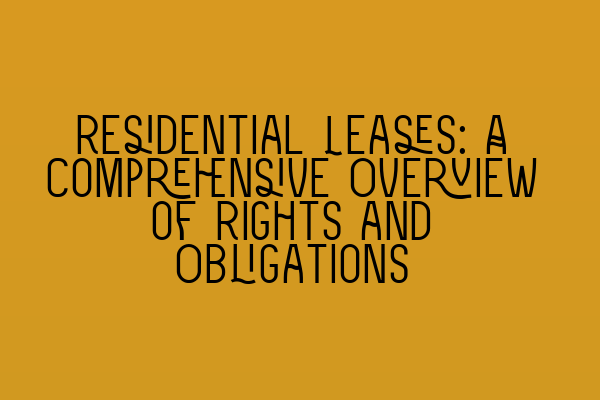Residential Leases: A Comprehensive Overview of Rights and Obligations
At SQE Property Law & Land Law, we understand the importance of knowing your rights and obligations as a tenant or landlord when it comes to residential leases. Whether you are a first-time tenant or an experienced landlord, having a comprehensive understanding of your rights and obligations can help ensure a smooth and mutually beneficial relationship between both parties. In this blog post, we will dive deep into the world of residential leases, covering essential topics such as lease terms, rent payments, maintenance responsibilities, and much more.
Before we embark on this journey, it’s important to note that this article serves as a general overview and should not be considered as legal advice. If you require specific legal advice, we recommend consulting with a qualified solicitor who specializes in property law.
Lease Terms: The Foundation of a Residential Lease
The lease terms form the foundation of any residential lease agreement. It is crucial for both landlords and tenants to clearly establish and understand the terms of the lease before signing it. The lease terms typically include the duration of the lease, rent amount, payment frequency, and any additional clauses or conditions agreed upon by both parties. Understanding and negotiating these terms can help ensure that the lease agreement meets the needs and expectations of both parties.
Rent Payments: The Financial Aspect of a Residential Lease
Rent payments are a vital aspect of any residential lease agreement. Tenants are obligated to pay rent on time and in the agreed-upon manner. Landlords, on the other hand, must provide tenants with a rent demand in writing, specifying the amount due and the payment deadline. It is essential for both parties to keep a record of all rent payments made and received. Failure to pay rent on time can have serious consequences, including eviction, so it is of utmost importance to prioritize rent payments.
Maintenance Responsibilities: Upholding the Condition of the Property
The maintenance of a rental property is a shared responsibility between landlords and tenants. Landlords are generally responsible for maintaining the structure of the property, including repairing any structural defects, electrical systems, and heating and plumbing installations. Tenants, on the other hand, are responsible for keeping the property in a reasonable state of cleanliness and informing the landlord of any necessary repairs. Regular communication between both parties is key to ensuring that the property is well-maintained and that any maintenance issues are addressed promptly.
Security Deposits: Protecting Both Landlords and Tenants
In many residential leases, landlords require tenants to pay a security deposit, which serves as a form of protection against any potential damages or unpaid rent. Landlords must protect the tenant’s security deposit by registering it with a government-approved tenancy deposit protection scheme. This ensures that the deposit is safeguarded and can be returned to the tenant at the end of the lease, minus any legitimate deductions for damages or unpaid rent. Tenants should take care to document the condition of the property at the beginning and end of the lease to avoid any disputes regarding the return of their security deposit.
Termination of the Lease: The End of a Residential Lease
The termination of a residential lease marks the end of the landlord-tenant relationship. The lease agreement should specify the notice period required to terminate the lease by either party. Landlords may terminate a lease due to non-payment of rent, property damage, or breach of other lease terms. Tenants, on the other hand, may terminate a lease with proper notice and under the circumstances outlined in the lease agreement. It is crucial for both parties to understand the termination provisions in the lease agreement to avoid any legal complications or disputes.
Conclusion
Understanding your rights and obligations as a tenant or landlord is essential for a successful and harmonious residential lease agreement. By familiarizing yourself with the lease terms, rent payment requirements, maintenance responsibilities, security deposit regulations, and lease termination procedures, you can protect yourself and ensure a smooth lease experience.
Remember, if you require legal advice or have specific questions regarding your residential lease, it is best to consult with a qualified solicitor who specializes in property law. At SQE Property Law & Land Law, we offer comprehensive legal services to help you navigate the complexities of residential leases and ensure the protection of your rights and interests.
Related Articles:
– Check out our SQE 1 Practice Exam Questions to enhance your knowledge and readiness for the SQE 1 exam.
– Practice mocks are the key to success in the SQE 1 exam. Take a look at our SQE 1 Practice Mocks FLK1 and FLK2.
– Are you preparing for the SQE 2 exam? Don’t miss out on our SQE 2 Preparation Courses to boost your chances of success.
– If you are starting your journey towards the SQE 1 exam, our SQE 1 Preparation Courses can provide you with the necessary knowledge and skills.
– Stay updated with the latest SRA SQE Exam Dates to plan your preparation effectively and secure your success.
Disclaimer: This blog post is intended for informational purposes only and should not be considered as legal advice. Please consult with a qualified solicitor for specific legal advice regarding your residential lease agreement.
